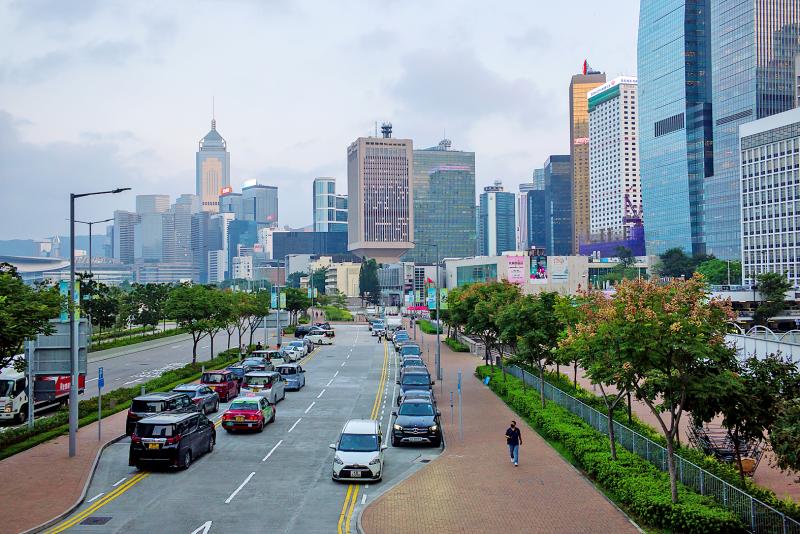Chinese President Xi Jinping (習近平) has deployed a top Xinjiang police official to command the nation’s army post in Hong Kong, raising fears that Beijing is taking an increasingly hard line on security in the territory.
Major General Peng Jingtang (彭京堂) is to become commander of the People’s Liberation Army’s (PLA) Hong Kong garrison at the request of Xi, the Chinese Ministry of National Defense said in a statement.
Peng was previously deputy chief of staff for the armed police force in China’s Xinjiang region, where the US government has accused China of repressive polices against Uighur Muslims, saying the policies amount to genocide. Beijing strongly denies the charge.

Photo: Bloomberg
China has in the past few years installed officials with experience heading crackdowns in key Hong Kong roles.
In early 2020, Luo Huining (駱惠寧), a Chinese Communist Party stalwart known for executing Xi’s anti-corruption campaign, became head of the central government’s powerful Liaison Office in the territory.
Xia Baolong (夏寶龍), known for prosecuting a campaign against Christian churches in Zhejiang Province, was named director of the Hong Kong and Macau Affairs Office that same year.
Hong Kong has also put former career police officers in key government roles in the wake of the territory’s large anti-government protests in 2019.
Former secretary for security John Lee (李家超) in June last year rose to the territory’s No. 2 government position — chief secretary for administration — while former police commissioner Chris Tang (鄧炳強) became security secretary.
The defense ministry said in a statement that Peng would work to “resolutely safeguard national sovereignty, security and development interests, and firmly safeguard” the stability of Hong Kong.
Last week, the Hong Kong garrison of the PLA conducted a high-profile drill to “demonstrate its confidence and determination to defend” the territory after Xi called on the military to adopt the latest technology to win future conflicts, the South China Morning Post reported.

The CIA has a message for Chinese government officials worried about their place in Chinese President Xi Jinping’s (習近平) government: Come work with us. The agency released two Mandarin-language videos on social media on Thursday inviting disgruntled officials to contact the CIA. The recruitment videos posted on YouTube and X racked up more than 5 million views combined in their first day. The outreach comes as CIA Director John Ratcliffe has vowed to boost the agency’s use of intelligence from human sources and its focus on China, which has recently targeted US officials with its own espionage operations. The videos are “aimed at

STEADFAST FRIEND: The bills encourage increased Taiwan-US engagement and address China’s distortion of UN Resolution 2758 to isolate Taiwan internationally The Presidential Office yesterday thanked the US House of Representatives for unanimously passing two Taiwan-related bills highlighting its solid support for Taiwan’s democracy and global participation, and for deepening bilateral relations. One of the bills, the Taiwan Assurance Implementation Act, requires the US Department of State to periodically review its guidelines for engagement with Taiwan, and report to the US Congress on the guidelines and plans to lift self-imposed limitations on US-Taiwan engagement. The other bill is the Taiwan International Solidarity Act, which clarifies that UN Resolution 2758 does not address the issue of the representation of Taiwan or its people in

US Indo-Pacific Commander Admiral Samuel Paparo on Friday expressed concern over the rate at which China is diversifying its military exercises, the Financial Times (FT) reported on Saturday. “The rates of change on the depth and breadth of their exercises is the one non-linear effect that I’ve seen in the last year that wakes me up at night or keeps me up at night,” Paparo was quoted by FT as saying while attending the annual Sedona Forum at the McCain Institute in Arizona. Paparo also expressed concern over the speed with which China was expanding its military. While the US

SHIFT: Taiwan’s better-than-expected first-quarter GDP and signs of weakness in the US have driven global capital back to emerging markets, the central bank head said The central bank yesterday blamed market speculation for the steep rise in the local currency, and urged exporters and financial institutions to stay calm and stop panic sell-offs to avoid hurting their own profitability. The nation’s top monetary policymaker said that it would step in, if necessary, to maintain order and stability in the foreign exchange market. The remarks came as the NT dollar yesterday closed up NT$0.919 to NT$30.145 against the US dollar in Taipei trading, after rising as high as NT$29.59 in intraday trading. The local currency has surged 5.85 percent against the greenback over the past two sessions, central